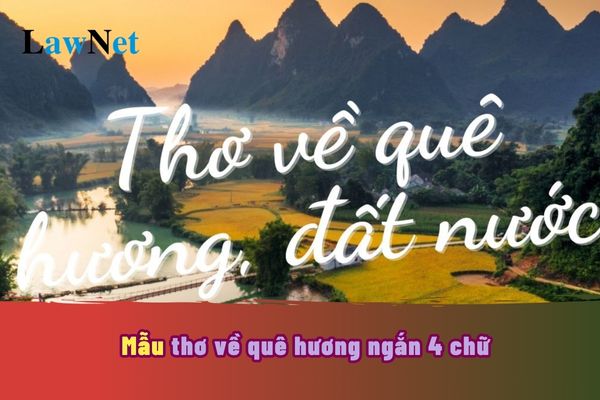Vietnam: What are the sample four-word poems about the homeland? What are the features of the 2018 General Education Program for Literature?
What are the sample four-word poems about the homeland?
7th-grade students can refer to the sample four-word poems about homeland below:
Sample Four-Word Poems about Homeland
Sample 1
Who will return to the isle
Blue sea radiant
Grass lush green
Gentle and familiar
Our beautiful homeland
Come, dear, please come
A small street corner
Beautiful sunset
Deeply imprinted in memory
Cannot forget
Is the love of homeland
Lingering remembrance
In the year of war
Bees gather in swarms
Could it be like the sound
Of enemy shouts
Then, after each battle
Level the battlefield
Destroy the whole flock
Drenched in blood and fire
Valiant homeland
Has always been like that.
Sample 2
Though traveling many places
Don't forget roots
Beloved homeland
Where we were born.
Though far apart
Heart always turns back
Beloved Vietnam
Sacred homeland.
Sample 3
It's the most beautiful in the province
Has Dam Bri Waterfall
Has Bao Loc Lake
Bao Loc, the joy
Bao Loc, the people
Everything is beautiful
I love Bao Loc.
Sample 4
She leaves school
The road with light rain
Young bird hiding beak
Under the golden flower trunk
Her steps are free
Moon-white dress
Tilted book bag hugged
Small shoulder long hair
He silently follows
Quiet shoe heel
Afternoon road pale
Light rain pensively.
Sample 5
The wind sings softly,
High branches chirping birds.
Bees and butterflies fly around,
Forever seeking sweet nectar.
The hometown river is gentle,
Water hyacinth drifts lightly.
Oars splashing in rhythm,
The scenery truly beautiful.
Who comes home,
Friends visit.
No forests, waves ocean,
Golden fields blowing.
Come just once,
Will captivate your heart,
Fragrant land of hometown,
Beautiful Hau Giang.
*Note: The above four-word poems about homeland are for reference only./.

What are the sample four-word poems about the homeland? What are the features of the 2018 General Education Program for Literature? (Image from the Internet)
What are the 07 prohibited acts for lower secondary school students in Vietnam?
According to Article 37 of the Regulations issued with Circular 32/2020/TT-BGDDT, the 07 prohibited acts for lower secondary school students in Vietnam include:
1. Disrespect the dignity, honor or bodily integrity of teachers, officials and staff of their schools, other people and other students.
2. Act dishonestly in learning, examinations or admission process.
3. Buy, sell or use alcohol, tobacco, drugs, other stimulants, firecrackers or explosives.
4. Use mobile phones and other devices in class for purposes other than learning and without the teacher's permission.
5. Fight or disrupt public or school order or security.
6. Use or exchange cultural products that incite violence or contain indecent materials; use toys or play games that impede their own healthy development.
7. Students shall not commit other prohibited acts provided for by regulations of law.
What are the features of the 2018 General Education Program for Literature in Vietnam?
Under Section 1 of the General Education Program for Literature issued with Circular 32/2018/TT-BGDDT:
- Literature is a subject in the field of Language and Literature Education, taught from grade 1 to grade 12. At the primary education level, this subject is called Vietnamese; at the lower and upper secondary education levels, it is called Literature.
- Literature is an instrumental and aesthetic-humanistic subject; it provides students with the means to communicate, serves as a foundation for studying all subjects and educational activities; it is also a vital tool in educating students on high cultural, literary, and national linguistic values, fostering healthy emotions, humanitarian sentiments, benevolent, altruistic living,...
- Through linguistic texts and vivid artistic imagery in literary works, via reading, writing, speaking, and listening activities, Literature plays a substantial role in helping students form and develop good qualities as well as core competencies to live and work effectively and to engage in lifelong learning.
- The content of Literature is comprehensive, encompassing cultural knowledge, ethics, and philosophy,... related to various subjects and educational activities such as History, Geography, Arts, Civic Education, Foreign Languages, Natural and Social Sciences, Experiential Activities, Career Orientation,... Literature closely relates to life; it helps students pay attention to and connect with everyday life, relate, and possess problem-solving skills for real-world issues.
- The core content of the subject includes fundamental, essential knowledge and skills about Vietnamese and literature that meet the required standards of student qualities and competencies at each educational level; it is divided into two phases: the basic education phase and the career-oriented education phase.
- Basic Education Phase: The program is designed around core strands corresponding to reading, writing, speaking, and listening skills. Vietnamese and literary knowledge is integrated during the reading, writing, speaking, and listening instruction process. The language materials are selected and organized according to the students' levels of receptivity at each educational level.
- The goal of this phase is to enable students to use Vietnamese proficiently for effective communication in life and to perform well in other subjects and educational activities; to form and develop literary competence, an expression of aesthetic competence; simultaneously cultivate thoughts, and emotions to develop students' souls, and character.
- Career-Oriented Education Phase: The program reinforces and develops the results from the basic education phase, helping students enhance their language and literary competencies, especially in literary text reception; strengthen the skills of creating argumentative texts and informational texts of greater complexity in content and writing techniques; provide some practical knowledge of literary history and literary theory in terms of reading and writing; continue to nurture thoughts, emotions, soul, and character so students become responsible citizens.
- Additionally, within each year, students oriented toward social sciences and humanities can choose to learn specific study topics. These topics aim to enhance literature and language knowledge, the skill of applying knowledge to practice, meeting students' interests, needs, and career orientation.

